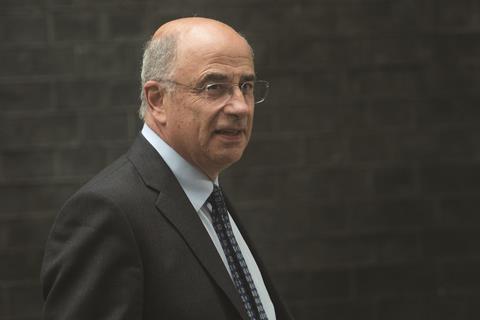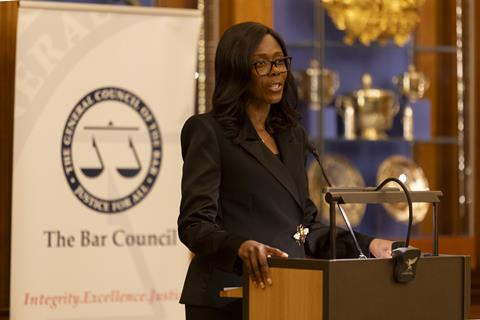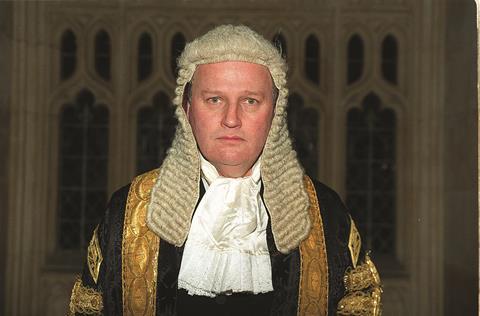Sir Brian Leveson’s review of the courts warns that ‘essential measures’ are needed to prevent ‘total collapse’. Crown court backlogs, trial by jury and ‘perverse fee incentives’ all came under his critical gaze

‘The system is too broken,’ Sir Brian Leveson declared this week in his 378-page review of the criminal courts. The former head of criminal justice remarked that ‘criminal justice is in crisis’, noting that in December, the Crown court backlog was then a record 74,592 cases; it has since climbed to 76,957.
A ‘radical and essential package of measures’ is required to prevent ‘total collapse’, he declared.
Unsurprisingly, national headlines centred on recommendations that would result in fewer jury trials. Defendants charged with offences carrying a maximum sentence of two years would no longer have the right to elect to be tried in the Crown court. Certain either-way offences, such as making off without payment or breach of an anti-social behaviour order, would be reclassified as summary only. The defendant’s right to elect would be restricted for offences such as assault on an emergency worker or stalking. Defendants in the Crown court could elect to be tried by a judge alone. Serious and complex fraud cases would be tried by a judge.
Leveson’s report says trial by jury is not always the most sensible approach to resolving the most difficult and complex cases. He points to the increased complexity of the factual matrix of such cases, the expert evidence deployed to establish them, and the increased efforts made to provide support and guidance to jurors. Moreover, ‘the personal and financial burden placed on jurors, particularly those involved in lengthy trials, is significant’, the report states.
'As Sir Brian recognises, it is the failure to invest properly in the justice system over decades that has led to the crisis we see in the criminal courts today'
Barbara Mills KC, Bar Council

The proposals have attracted much criticism. Criminal defence solicitor Marcus Johnstone, of PCD Solicitors, said dispensing with jury trials for some sexual offence cases may work in theory, but Johnstone ‘cannot envisage even a fraction of defendants choosing to concede their right to a trial by their peers, when judges are often more likely to convict than jurors’.
Bar Council chair Barbara Mills KC (pictured) said changing the fundamental structure of criminal justice is not a principled response, given that the crisis was not caused by that structure in the first place. ‘As Sir Brian recognises, it is the failure to invest properly in the justice system over decades that has led to the crisis we see in the criminal courts today,’ she said.
Leveson also recommends the establishment of a new division of the Crown court, in which cases would be heard by a judge flanked by two magistrates. The new Bench Division would have the potential to hear all either-way offences.
Mark Beattie, national chair of the Magistrates’ Association, said an extra 6,000 magistrates would have to be recruited to ensure the new division runs successfully, and to maintain capacity in the magistrates’ courts.
Solicitors also feature in Leveson’s report. He wants the government to end ‘perverse incentives’ that drive cases to trial and discourage early guilty pleas.
A disparity in fees means ‘solicitors are likely to be paid more by the defendant not pleading guilty at the first hearing but instead proceeding to the Crown court before pleading’, the report states. ‘The solicitor would thereby obtain the Crown court fee for a sentencing hearing, rather than the fee for a guilty plea and sentence in the magistrates’ court (and potentially for a committal for sentence to the Crown court in some cases).’
Perverse incentives are ‘contributing to a general trend of guilty pleas being made later in the court process and causing decisions to be made which are not always in defendants’ best interests. This is delaying justice, adding to the open caseload and reducing confidence in the criminal justice system’.
Tale as auld as time
If some of Leveson’s proposed reforms sound familiar, that is because they are. As Sir Brian notes in his report, a number of his recommendations echo previous recommendations.
Lord Justice Auld’s (pictured) 2001 blueprint for criminal law proposed unifying the magistrates’ and Crown courts into a single structure comprising three divisions: Crown; magistrates; and a new intermediate district division constituted by a professional judge and two lay magistrates.
‘The strongest impression that I have formed of the criminal justice system in the course of the review is of the complexities in every corner of it. Their consequence is much damage to justice, efficiency and effectiveness of the system and to the public’s confidence in it,’ Auld said.

In addition, a reliance on pages of prosecution evidence ‘appears to be creating a perverse incentive against defence solicitors advising clients to plead guilty early (where that is in the client’s best interests) so as to claim a higher fee for their work done’.
Leveson says legal aid fee schemes should incentivise the early resolution of a case. He calls for an end to the reliance on pages of prosecution evidence as a proxy for the complexity of a case and assessment of fees.
Law Society president Richard Atkinson said many interconnected issues in the system affect when a guilty plea is given. ‘For example, there are often delays in full disclosure of evidence to the defence, without which a plea cannot be made,’ he noted. Chancery Lane has long called for a move away from the use of pages of prosecution evidence as a yardstick.
Atkinson said Chancery Lane supports the earliest resolution of a case – and solicitors play a key role in achieving this. ‘Solicitors’ professional duties require them to give clients the appropriate advice at each stage of their case. But the fee structure for criminal legal aid work does need to be looked at across the whole system, to ensure all work is properly remunerated and that it fully supports all stages of a case.’
Lord chancellor Shabana Mahmood announced a further pay rise for criminal legal aid lawyers in December, which will take the total fee uplift to 24% over this parliament. Atkinson said the injection of additional funds into criminal legal aid fees is a positive development, ‘but it remains to be seen whether the increased funding will target the areas where it can be most effective’.
Leveson’s recommendation of a maximum 40% sentence reduction for defendants who plead guilty at the first opportunity could have unintended consequences, warned Caroline Black, a consultant at Gherson Solicitors. ‘For those operating in the corporate world, this may have an unintended knock-on effect on the Serious Fraud Office’s ambition to encourage self-reporting and deferred prosecution agreements (DPAs),’ Black said.
'Jury trials will remain a cornerstone of our justice system in the most serious cases, but we have to recognise that they take five times longer than cases heard in magistrates’ courts'
Shabana Mahmood, lord chancellor
‘Currently, a maximum of 50% discount has been applied to DPA penalties, where companies have shown exemplary cooperation (often taking steps such as self-reporting, undertaking an extensive and costly investigation, disclosing thousands of documents, and waiving legal privilege over certain material). If the discount available for a DPA is now only 10% more than for an early guilty plea, companies may be more inclined to roll the dice on self-reporting, hoping instead that any wrongdoing can be dealt with internally without ever coming to the attention of the authorities.’
Welcoming the report, Mahmood declared she would do ‘whatever it takes to bring down the backlog and deliver swifter justice for victims’. Her comments in the House of Commons the day before the report came out suggest curbing jury trials will be high on the government’s agenda.
Mahmood told MPs: ‘Jury trials will remain a cornerstone of our justice system in the most serious cases, but we have to recognise that they take five times longer than cases heard in magistrates’ courts, and magistrates’ courts already hear 90% of all criminal trials. With victims waiting so long for their day in court, we must ask whether there are cases being heard by juries today that need not be heard by juries in future.’
The government will publish its full response to Leveson’s review ahead of legislation this autumn. And there is more to come. Leveson was also commissioned to look at court efficiency, a topic he explored a decade ago. Part two of his criminal courts review will be published later this year.
Key recommendations at a glance
- Greater consideration of out-of-court resolutions, such as cautions, when making a charging decision.
- Expanded deferred prosecution scheme.
- Remove the right to elect for certain low-level offences.
- Adjust legal aid fee schemes to recognise work done to prepare for plea and trial preparation hearings.
- Increase maximum sentence reduction for entering a guilty plea at the first available opportunity to 40%.
- Increase income thresholds for legal aid in the magistrates’ court in line with current Crown court criteria for either-way cases.
- Establish a new division of the Crown court with cases heard by a judge and two magistrates.
- Allow defendants in the Crown court to be tried by a judge, not a jury.
- Serious and complex fraud cases should be tried by judge alone.
This article is now closed for comment.




































11 Readers' comments